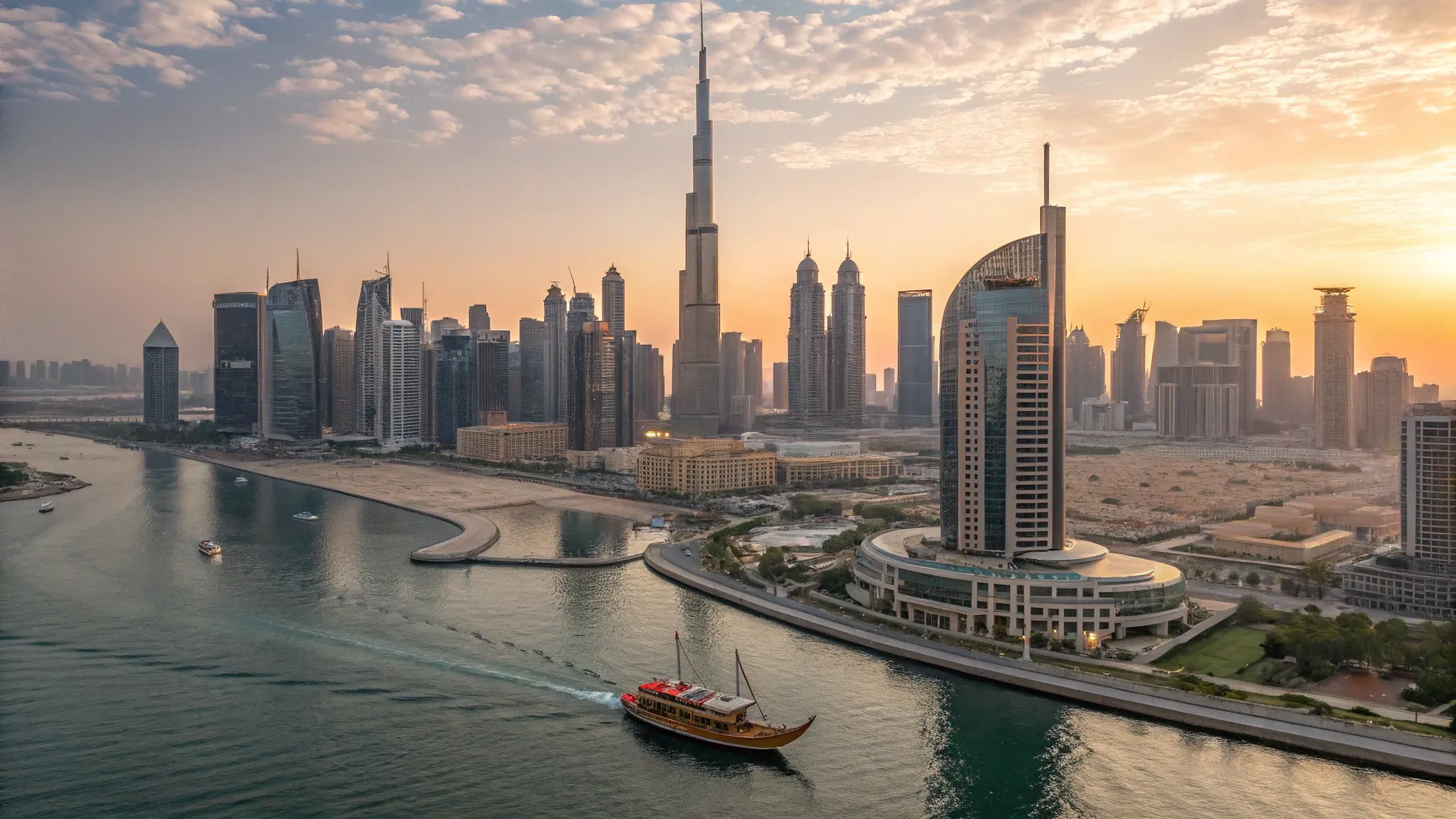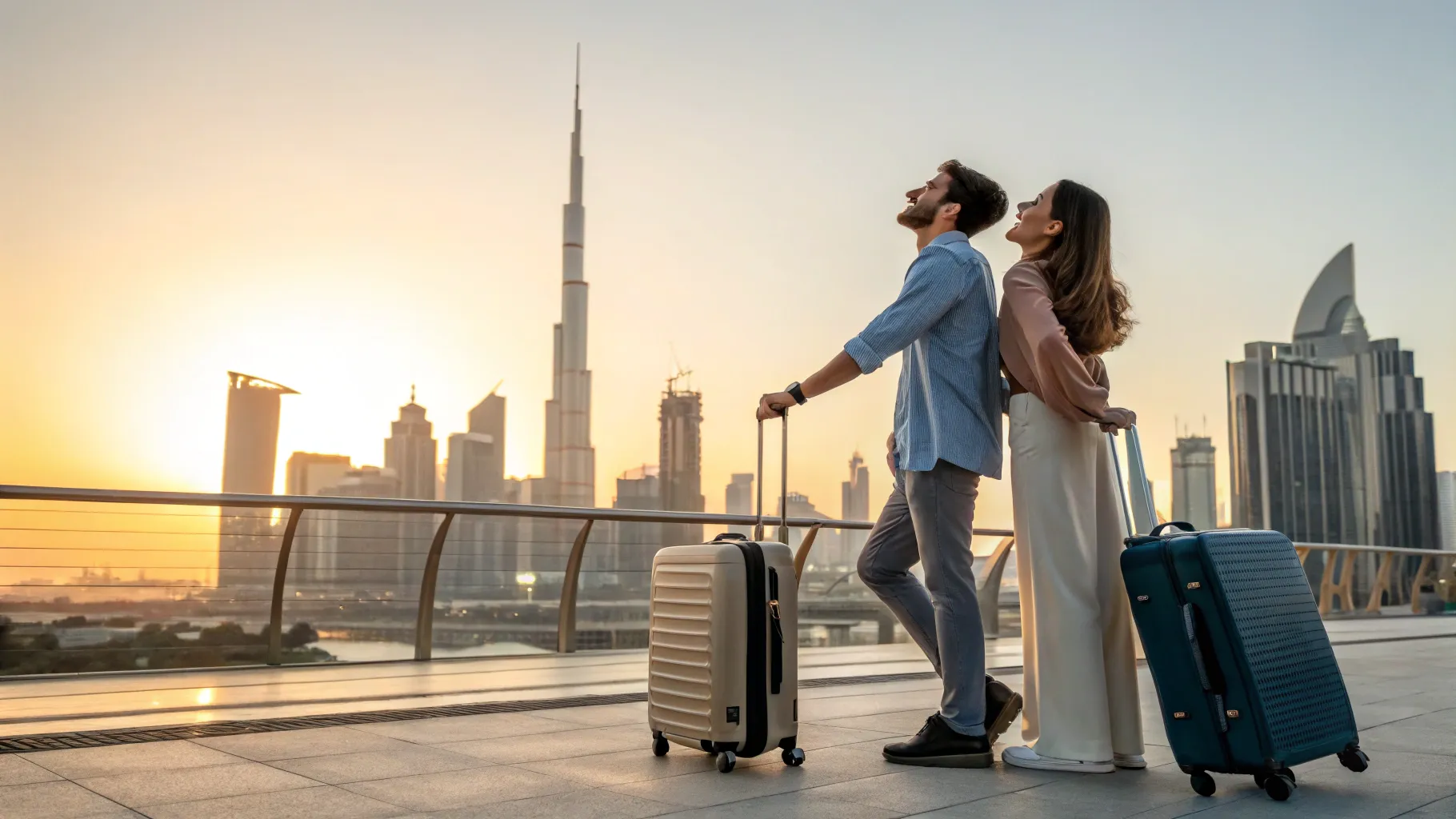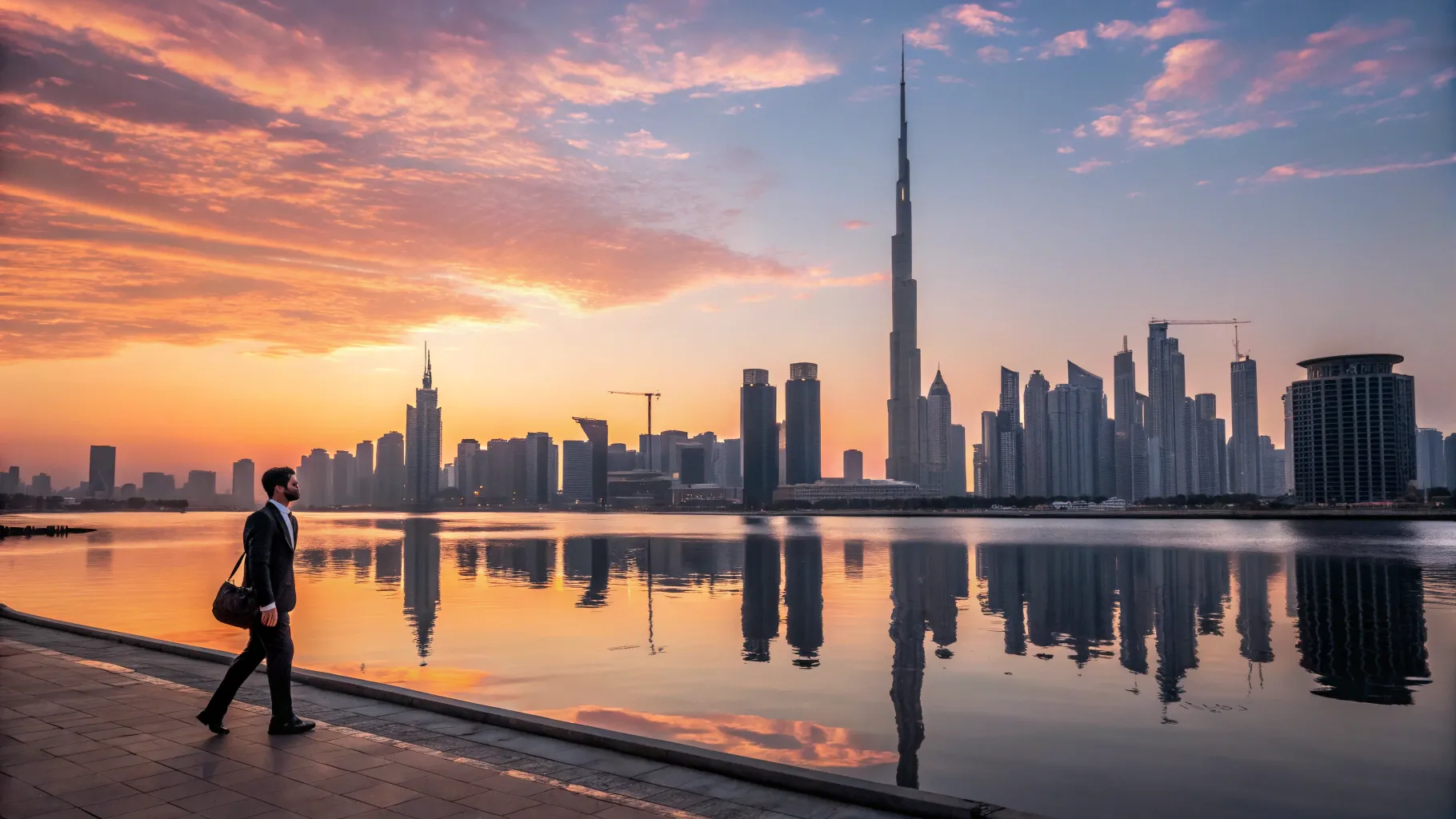- Blog
- moving to dubai from us guide
Moving to Dubai from US: The Ultimate 2026 Relocation Guide
![Moving to Dubai from the US: Your Complete Guide [2025]](https://media.justmovedubai.com/Moving to Dubai from the US Your Complete Guide [2025].webp)
Relocating to Dubai from the US? Learn about visas, tax benefits for Americans, housing, and business setup in our comprehensive 2026 relocation guide.
Founder of JustMove
Summarize content with
Get AI-powered insights and summaries of this article
Just Move is the preferred partner of entrepreneurs
Expert in incorporation, accounting and immigration
Trusted by over 500+ entrepreneurs
4.9/5 reviews from our clients
100% satisfaction across all services
Content
- Why Americans are Choosing Dubai: Benefits and Lifestyle
- Understanding Visa Options and Documentation
- Taxation and Business Setup for US Expats
- Settling In: Housing, Healthcare, and Transportation
- Family Life and Cultural Etiquette
- Logistics: Shipping and Moving Your Belongings
- Frequently Asked Questions
- Starting Your Dubai Journey
The allure of the UAE has never been stronger for American entrepreneurs and professionals seeking a tax-efficient, high-growth environment. As we move through 2026, Dubai stands as a global beacon of modern infrastructure and a vibrant expat lifestyle, making the transition from california to dubai an increasingly popular choice for those going abroad.
This moving to dubai from us guide is crafted for startups, SMEs, and freelancers who want to navigate the complexities of international relocation without the stress. Whether you are looking to relocate your existing operations or start a new venture, this resource solves the problem of information overload by providing a clear, professional roadmap for your new life in the Middle East.
You are certainly not alone in this journey. Around 40,000 Americans reside in Dubai, forming one of the largest expat communities in the emirate. This established community ensures that while you are moving thousands of miles, you will find a familiar sense of belonging amidst the beautiful skyline and world-class amenities of living in dubai.
Throughout this comprehensive guide, we will walk you through every critical step, including the visa application process, finding the perfect home, and leveraging Just Move’s digital-first business setup services. From navigating the 2026 tax compliance landscape to securing your residency in record time, we have you covered.
Success in the Middle East begins with a clear understanding of the regulatory environment and the logistical milestones required to make your transition permanent.
Why Americans are Choosing Dubai: Benefits and Lifestyle
Deciding to relocate from the US to the Middle East is a strategic move for many modern entrepreneurs. For those using this moving to dubai from us guide, the financial benefits often serve as the primary catalyst. The shift from california to dubai represents a fundamental change in how you manage your wealth and business growth in 2026.
A Moving to Dubai From US Guide to Financial Benefits
Dubai offers zero personal income tax, a significant draw for professionals and families seeking financial advantages compared to california. When you factor in the absence of state and federal taxes, the cost of living in Dubai can be around 15-20% more affordable than major Californian cities. This allows SMEs and freelancers to reinvest their earnings directly into their beautiful new quality of life.
Enhanced Purchasing Power for Expats
The economic landscape favors the individual, with higher earning potential across most sectors. The average salary in Dubai is AED 16,775 per month (about $4,570 USD), which is higher than the average monthly income in the US ($3,900). For someone going abroad, this income disparity creates a massive boost in disposable income compared to their home market.
Just Move streamlines this transition by handling the complex visa and setup requirements via a fully digital experience. Whether you are moving a startup or expanding as an investor, our expert team ensures your relocate process is efficient. We help you navigate the 2026 regulatory environment, ensuring you benefit from the best living in dubai experience without bureaucratic hurdles.
Tax Efficiency: Retain 100% of your personal earnings without local deductions or social security taxes. Market Access: Position your business in a global hub with 24/7 support and access to emerging markets. Digital Lifestyle: Manage your entire residency and company formation process through a 100% online platform with Just Move.
Understanding the lifestyle and financial perks is just the first step in this comprehensive guide. Once the benefits are clear, the next priority is choosing the right legal framework for your specific business operations.
Understanding Visa Options and Documentation
For Americans moving from california to dubai, the first logistical hurdle is transitioning from a visitor to a resident. While US citizens typically receive a 30-day entry permit upon arrival, living in dubai legally for the long term requires a formal residence visa and a work permit. This moving to dubai from us guide highlights that your initial entry is just the start of a beautiful journey toward permanent residency.
Exploring the Moving to Dubai From US Guide Visa Pathways
The 2026 UAE visa landscape is designed to attract diverse talent and investment. The Golden Visa provides long-term, 10-year residency for significant investors and specialized talent, while the Green Visa offers a 5-year self-residency option for skilled professionals. For those going to the UAE to continue their US-based career, the Remote Work Visa requires a proven monthly income of at least USD 3,500.
Just Move advises entrepreneurs that while the Remote Work Visa is flexible, foreign tax authorities may still claim you as a resident if you spend less than 183 days in the country. Our experts help you navigate these nuances to ensure your relocate strategy is airtight from day one.
Essential Documentation for California Expats
Preparing your paperwork is a critical step to ensure your move from california to the Middle East remains on schedule. To have your US-issued documents recognized, you must follow a specific authentication chain that involves both local and federal authorities.
Step 1: Obtain an apostille for your educational degrees or marriage certificates from the California Secretary of State to verify their authenticity. Step 2: Secure a mandatory stamp from the UAE Ministry of Foreign Affairs (MOFA) once you arrive to finalize the legalization process. Step 3: Provide a valid proof of address, such as a recent utility bill or bank statement, which is now a mandatory requirement for all 2026 setups.
Our team facilitates this entire process digitally, helping you secure your medical visit, biometrics, and Emirates ID in only one week. We prioritize compliance, ensuring you avoid high-risk structures like illegal third-party freelance permits that could jeopardize your life in the UAE.
Securing your residency permit provides the legal foundation for your transition, yet the true potential of your move is unlocked when you align your legal status with the most efficient corporate structure.
Taxation and Business Setup for US Expats
Transitioning from california to dubai requires a clear understanding of tax obligations to ensure your move is truly profitable. While many believe the UAE is completely tax-free, this moving to dubai from us guide clarifies the complexities specifically for American entrepreneurs.
Navigating the Moving to Dubai From US Guide Tax Landscape
While there is no income tax in the UAE, US citizens may still owe taxes to the IRS. This is a critical distinction for those moving from california or other states, as the US taxes its citizens on worldwide income regardless of where they reside.
Effective planning involves utilizing the Foreign Earned Income Exclusion (FEIE) or foreign tax credits to manage your liability. However, for entrepreneurs living in dubai, the corporate tax environment is remarkably favorable compared to the high-tax burdens found in the US.
Strategic Business Structures in Dubai
Dubai's free zones, such as Dubai Internet City or DIFC, offer full foreign ownership and zero corporate tax for businesses. These zones are specifically designed for those looking to relocate their operations to a beautiful global hub without losing control of their assets.
Just Move works by simplifying the selection process, helping you choose from over 50 free zones. Most digital entrepreneurs prefer free zones because they allow for 100% foreign ownership and provide a life of operational ease with no territorial restrictions on global trade.
For businesses with revenue under 3,000,000 AED, Small Business Relief (SBR) allows for 0% corporate tax until December 31, 2026. This makes going through the setup process now particularly advantageous for SMEs looking to maximize their early-stage growth, and you can easily estimate your Dubai business setup cost to plan your investment.
Step 1: Select a free zone to maintain 100% ownership and 0% tax on qualifying income. Step 2: Secure your trading license and visa in as little as 1 to 5 business days with Just Move. Step 3: Register for corporate tax and monitor the 375,000 AED VAT threshold.
Just Move ensures your setup is 100% online and compliant with the latest 2026 regulations, including the new mandatory e-invoicing requirements. Once your business is legally established and your tax strategy is optimized, your focus will naturally shift to the logistical elements of settling your family and belongings into your new home.
Settling In: Housing, Healthcare, and Transportation
Transitioning from california to dubai requires a clear understanding of local systems to ensure a smooth transition. This moving to dubai from us guide highlights the essential steps for establishing your household and getting mobile in 2026.
Navigating the Moving to Dubai From US Guide Checklist
Housing Leases: When considering housing, it's useful to explore the best areas to live in Dubai. Housing leases in Dubai are commonly for 12 months, with rent often paid in one to four postdated checks, and all contracts must be registered with Ejari. This centralized system provides a beautiful level of transparency and legal protection while living in dubai.
Healthcare Costs: Managing your wellness is vital when you relocate to the UAE. Mandatory health insurance in Dubai for residents can range from approximately $800 to $5,000 annually, depending on the plan's comprehensiveness. You must secure this coverage to maintain your residency visa status.
Driver's Licenses: If you are moving from california, you will find the process of getting behind the wheel quite simple. Californians can typically exchange their U.S. driver's license for a UAE license with minimal steps at the Roads and Transport Authority (RTA).
High-Speed Travel: For those going on longer commutes, the road network in dubai is built for extreme efficiency. Speed limits on some Dubai highways can allow up to 160km/h (99mph), facilitating quick travel between major business hubs and residential areas.
Daily Life: Understanding these logistical pillars is essential for any American entrepreneur looking to build a stable life in the Middle East. Use these local systems specifically for managing your transition costs and ensuring your family remains compliant with regional laws.
Establishing a solid domestic foundation allows you to turn your full attention toward the professional benchmarks and operational requirements for long-term growth. Mastery of your new environment is the final piece needed to ensure your venture thrives in this dynamic market.
Family Life and Cultural Etiquette
Settling your family in the UAE is a significant milestone when moving from california to dubai. This moving to dubai from us guide ensures you understand the personal side of relocation, from schooling to legal boundaries.
Sponsoring Your Family for Living in Dubai
Once Just Move secures your investor visa, you can begin the sponsorship process for your dependents. The UAE has specific financial requirements based on the sponsor's gender to ensure life in the city is sustainable.
Men sponsoring family: A minimum monthly salary of AED 4,000 (US$1,089) is required to sponsor a spouse and children. Women sponsoring family: A minimum monthly salary of AED 10,000 (US$2,723) is required for women to sponsor their family members.
Education and Schooling in the UAE
Families going through this transition will find world-class education options. International schools in dubai follow American, British, or IB curricula, allowing for a seamless educational transition for children from california.
School fees: Tuition for expat children typically ranges from AED 12,723 to AED 64,093 ($3,463–17,449) per year depending on the grade level and institution. Campus facilities: Many schools offer beautiful facilities, including Olympic-sized pools and advanced technology labs, enhancing the standard of living in dubai.
Essential Cultural and Legal Regulations
While dubai is a cosmopolitan hub, it maintains conservative values that all residents must relocate with in mind. This guide highlights critical laws that differ significantly from those in the United States.
Cohabitation laws: In the UAE, it is illegal to live with a member of the opposite sex unless they are a close family relative or your spouse. Public behavior: Certain behaviors accepted in the US, such as public displays of affection, are criminalized in the city. Medication control: Some medications available in the US may be illegal in the UAE, and prescription medications require prior approval from the UAE’s Ministry of Health.
Understanding these nuances ensures your transition is safe and respectful of local traditions. With your personal life settled and your cultural awareness sharp, you are ready to focus on the strategic steps needed to finalize your move.
Logistics: Shipping and Moving Your Belongings
Planning your physical relocation is a critical component of any moving to dubai from us guide. The logistical transition from california to dubai requires a strategic choice between cost-efficiency and speed to ensure your arrival in the uae is seamless.
Choosing Freight for Moving to Dubai From US Guide
Sea Freight: This method works by utilizing large shipping containers and is the most cost-effective option for bulk items. Sea freight for moving from California to Dubai typically takes 6-8 weeks, while air freight is faster but more expensive.
Air Freight: Use air freight specifically for essential household items and documents that you need immediately upon arrival. While it significantly reduces the wait time, the premium cost usually limits its use to smaller, high-priority shipments.
Transitioning Your Life to a Beautiful New City
As you are going through your inventory, consider that living in dubai often involves access to high-end, furnished properties. You may only need to relocate sentimental items or specialized equipment, simplifying your move to this beautiful destination.
Ensuring your personal belongings arrive safely is just as vital as securing your investor visa or business license. Just Move manages the complex administrative side of your life in dubai, so you can focus on the physical logistics of moving.
With your physical goods in transit, you can turn your attention to the legal and financial frameworks that will define your success in the region.
Frequently Asked Questions
Can I drive in Dubai with my US license?
US license holders can exchange their valid American driver’s license for a UAE license without undergoing a road test. This administrative process involves a simple eye test and a visit to the RTA to ensure your moving transition is smooth. While you are going between appointments on a tourist visa, you may drive a rental car using your original US permit.
Is it legal for unmarried couples to live together in Dubai?
Unmarried couples can legally cohabitate in the UAE following recent legislative reforms to the personal status laws. This change makes living in dubai much simpler for international partners who wish to relocate together without a marriage certificate. However, keep in mind that you must still be legally married to sponsor a partner for a residency visa through Just Move.
How do school systems in Dubai compare to the US?
Dubai school systems offer a wide variety of American and International Baccalaureate (IB) curricula that mirror the standards found in the United States. Many beautiful campuses in dubai provide a seamless academic transition for children moving from california to dubai. Most private schools are KHDA-regulated, ensuring the educational quality matches or exceeds what students experience in the US.
Do I still have to file taxes in the United States?
US citizens must file annual federal tax returns with the IRS regardless of their physical residency in the UAE. Although the UAE offers a 0% personal income tax rate, the US taxes its citizens on worldwide income. This moving to dubai from us guide recommends speaking with a specialist about the Foreign Earned Income Exclusion to ensure your new life abroad remains compliant with all home-country regulations.
Navigating these common concerns is the final step in preparing for a successful transition to one of the world's most dynamic business hubs.
Starting Your Dubai Journey
Navigating the transition from california to dubai requires careful coordination of logistics, visa processing, and business formation. This moving to dubai from us guide has outlined the essential path for entrepreneurs and investors looking to relocate and start living in dubai. From securing your trading license in as little as 1-5 days to understanding the 2026 tax landscape, your journey involves moving your life and career to a dynamic global hub.
Whether you are going to a beautiful new residence or setting up a digital nomad base, Just Move simplifies the entire process. We offer a 100% online registration experience, ensuring your setup is fast and compliant with the latest UAE regulations. Ready to secure your trade license and visas efficiently? Our team manages every detail from residency biometrics to banking assistance, saving you time and ensuring you avoid the risks associated with non-compliant structures.
Finalizing Your Moving to Dubai From US Guide
Ready to begin your relocation? Reach out to the experts at Just Move for a professional consultation. We provide the specialized support needed to ensure your moving to dubai from us guide results in a successful and seamless transition to the Emirates.
Founder of JustMove
Kasia is a renowned expert in business setup and relocation services in Dubai. With a proven track record as a top-performing account executive at PayPal and co-founder of luxury concierge service Alotea, she brings a wealth of experience to her role at JustMOVE. Kasia's deep understanding of the UAE market, extensive international connections, and multilingual capabilities (English, Polish, Russian, and French) make her an authority in navigating the complexities of business setup and relocation. Through the JustMOVE blog, Kasia shares her insights and practical advice to help entrepreneurs and families establish and grow their presence in the UAE. Her commitment to delivering personalized, transparent, and efficient solutions has earned her the trust of countless clients.
Check out more related articles

By Kasia

By Kasia
![Moving to Dubai from the US: Your Complete Guide [2025]](https://media.justmovedubai.com/Moving to Dubai from the US Your Complete Guide [2025].webp)
By Kasia

By Kasia

By Kasia

By Kasia